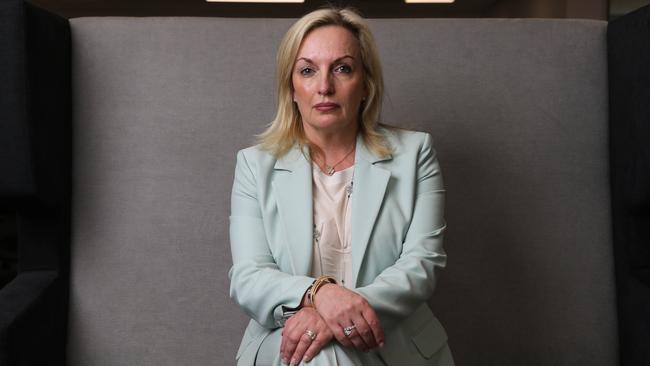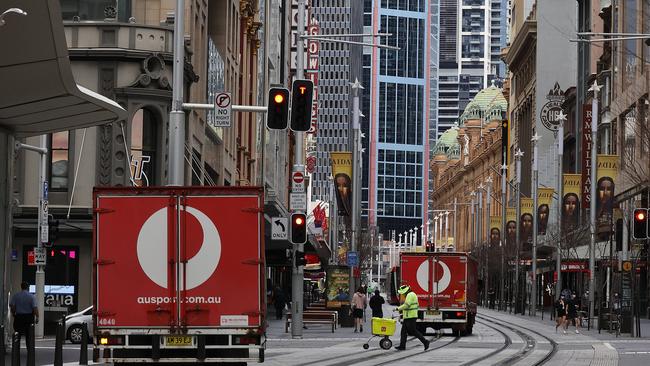Christine Holgate’s Global Express fights for Australia Post access
Holgate wants to co-opt Aussie Post to allow Global Express, formerly Toll, to use some of its services in rural and regional rather than having to double up on infrastructure and build out its own. But Holgate now leads the main competition to the lucrative side of Aussie Post’s business – parcels.
Holgate has been on a mission to turnaround and grow Global Express for private equity owner Allegro Funds. Revenue for the year to March was up 11 per cent to $3.6bn and momentum is building.
The Global Express camp says Aussie Post refuses to be the default pick-up point for parcels it tries to deliver when the customer is not home. It also wants access to lockers at community post offices. It is prepared to pay commercial rates for both.
At every level – from consumer service, carbon emissions, to the local community post offices – the Holgate team says its offer to put more parcels though the Australia Post network make sense for both players.
Australia Post does not agree.

The government business enterprise, also dealing with the community service obligation of letters, is not comfortable with a privately agile parcels business cherry-picking the use of its infrastructure. Why should it risk a loss of parcel market share?
Aussie Post says it is an open access network that works with dozens of operators, provided they pay the right fee for service.
Competition in parcels will get tougher as the e-commerce jump during lockdowns wanes. Last week in the US, FedEx lost $US11bn in value on news that demand in freight was deteriorating, and it had pulled its forecasts.
If this negotiation takes on a political hue, Holgate has a unique set of credentials, including good contacts with Aussie Post’s owner, the Labour government. She was prominent at the recent Jobs and Skills Summit. She knows the internal running of Australia Post intimately and has friends there.
Holgate also has support from the network of community post offices, Aussie Post’s franchisees who she nurtured while chief postie and who backed her after she was roasted by the Morrison government.
Australia Post remains firm on the decision to refuse Global Express bypassing its network fees to access the community post offices. It says in the parcels business, the network built by the Australian taxpayer today gives it competitive advantage. You don’t see Woolworths delivering for Coles.
Global Express points out that rival DHL is allowed to use Australia Post services, which goes against competitive neutrality rules. But Aussie Post says this is a bespoke deal based on incoming parcels from overseas where DHL uses more of the network and DHL also handles the last mile for Aussie Post in remote areas overseas.
Global Express insists that it has even asked for the same services, but that Aussie Post refuses to come back with any terms – a claim disputed by Australia Post.
Unpacking what is and what is not a level playing field is a job for regulators and for Aussie Post’s two government shareholders, led by the Ministers of Finance and Communications. There may be consequences for the government dividend.
Global Express questions whether Australia Post is complying with the government’s competitive neutrality policies. But Holgate has not gone as far as other competitors.
This year DHL, FedEx and UPS have jointly mounted a formal competitive neutrality complaint against Australia Post over the different treatment it receives as a letter provider: at the border on imports of small parcels, and in government support and regulation. Fierce competitors use all the tools in the kit.
There is politics in the family owned community post offices, who are backing Holgate. Spokeswoman Angela Cramp in Wollongong says they are locked into contracts to provide exclusive use to Australia Post between 8am and 6pm, yet they are paid by transaction, not by the hour. Now the pandemic sugar hit is over, they need all the business they can get.

If Australia Post is able to choose other hubs like pharmacies and gas stations, Cramp asks why community post offices cannot offer local customers a pick-up for their parcel rather than paying $60 for a next day delivery or driving for an hour to fetch it?
She says in far-flung Australia, Aussie Post is often the only option for e-commerce small businesses, which is limiting. She points to the deal Holgate engineered with big banks for community post offices to be tellers to the nation.
Operationally, Global Express and Aussie Post say they have a good working relationship.
Global Express sees a second infrastructure rollout for the bush as nonsensical, not least because the last mile logistics account for 30 per cent of carbon emissions. It would be a big call for a PE owned like Global Express to build its own network, but it is certainly stirring the possum.
As the parcel markets gets tighter, competitors are questioning Aussie Post’s leveraging of what they see as its monopoly letters network of posties and post offices into a parcels business — something Holgate actually drove very effectively for it during Covid-19.





Christine Holgate, chief executive of Team Global Express, is knocking on the door of her old shop Australia Post. If that door remains shut, she is going to knock louder.